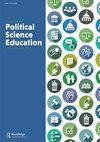构思-设计-实施-操作:提高政治学学习成绩、参与度、满意度和就业能力的教学创新
IF 0.6
Q3 POLITICAL SCIENCE
引用次数: 0
摘要
本文介绍了一种新的政治学教学方法。在工程教育中,"构思-设计-实施-操作"(CDIO)教学法提供了一种积极的、体验式的学习经历,围绕产品开发的四个关键阶段组织学习。将这一教学法创新应用于政治学和国际关系(IR)本科生课堂,使其适用于政策制定的学习、教学和评估。这种 "设计-构建-测试 "的教学方法在工程教育中取得了巨大成功,帮助学生在毕业时成为 "行业就绪工程师"。三届学生的学习结果表明,这种教学创新在应用于政治学和投资者关系学时也取得了巨大成功,支持政治学学生培养 "为社会做好准备 "的态度、品质和技能,大大提升了学生的学习体验,提高了他们的学业成绩、参与度、包容性和更广泛的毕业成果。公民参与以及理解和应对各种利益相关者的能力也得到了提高。本文以案例研究的形式介绍了该教学法及其应用的模块,然后强调了政治学教育工作者将该教学法应用到自己的教学环境中的机会。本文章由计算机程序翻译,如有差异,请以英文原文为准。
Conceive-design-implement-operate: pedagogical innovation to enhance attainment, engagement, satisfaction and employability in political science
This paper introduces a new pedagogic approach to the teaching of political science. In engineering education, the Conceive-Design-Implement-Operate (CDIO) pedagogy provides an active, experiential learning experience, structuring learning around four key phases in product development. Applied to the undergraduate Politics and International Relations (IR) classroom, this pedagogical innovation in learning, teaching and assessment is adapted to policy development. This design-build-test pedagogical approach has been highly successful in engineering education, supporting students to be “industry-ready engineers” on graduation. Results across 3 cohorts suggest that this pedagogical innovation is also highly successful when transferred to Politics and IR, supporting political science students develop “society-ready” attitudes, attributes and skills, greatly enhancing the student experience and increasing their attainment, engagement, inclusion and wider graduate outcomes. Civic engagement and the ability to understand and respond to a range of stakeholders are also improved. This paper presents the pedagogy and the module to which it was applied as a case study, before highlighting opportunities for political science educators to transfer the pedagogy to their own teaching context.
求助全文
通过发布文献求助,成功后即可免费获取论文全文。
去求助
来源期刊

Journal of Political Science Education
POLITICAL SCIENCE-
CiteScore
1.80
自引率
36.40%
发文量
69
期刊介绍:
The Journal of Political Science Education is an intellectually rigorous, path-breaking, agenda-setting journal that publishes the highest quality scholarship on teaching and pedagogical issues in political science. The journal aims to represent the full range of questions, issues and approaches regarding political science education, including teaching-related issues, methods and techniques, learning/teaching activities and devices, educational assessment in political science, graduate education, and curriculum development. In particular, the journal''s Editors welcome studies that reflect the scholarship of teaching and learning, or works that would be informative and/or of practical use to the readers of the Journal of Political Science Education , and address topics in an empirical way, making use of the techniques that political scientists use in their own substantive research.
 求助内容:
求助内容: 应助结果提醒方式:
应助结果提醒方式:


